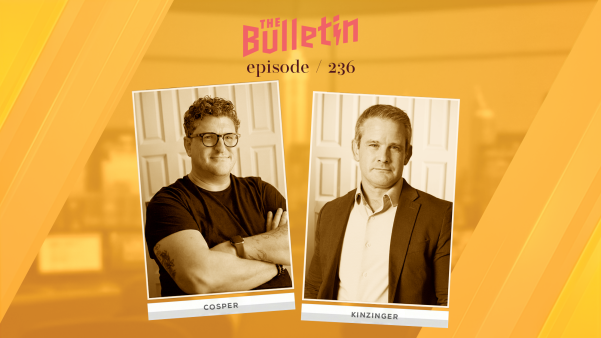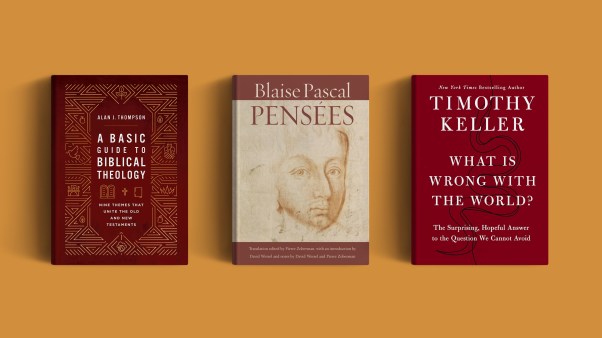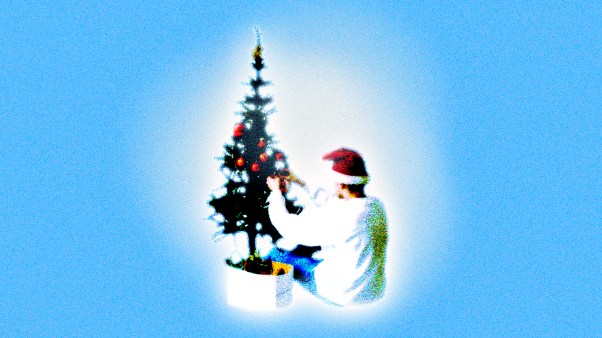My parents, both of whom grew up in the largely unchurched Pacific Northwest, became Christians as young adults. They attended a non-denominational church and considered themselves “fundamentalists,” which out there meant “basically conservative Christians with a Scofield Reference Bible on a shelf somewhere.” Then they moved to the more theologically stratified Midwest. Suddenly, “fundamentalist” meant no pinochle on Friday, no shorts in the summer, and no sherry in the beef stroganoff.
And so, without changing much of their theology, they became “evangelicals” instead.
My experience with fundamentalism, then, came secondhand, but I do understand something of the movement’s nebulous relationship to evangelicalism. Richard J. Mouw, president of Fuller Theological Seminary in California, has actually lived in both camps. He believes that what lies between them isn’t a chasm but a well-worn sawdust trail.
Late last year Mouw published The Smell of Sawdust: What Evangelicals Can Learn from Their Fundamentalist Heritage (Zondervan). He writes, “I have spent a good part of my life thus far working with other evangelicals who have been dedicated to correcting some of the defects and excesses associated with the religion of the sawdust trail. This has been time well spent. But I’ve also begun to worry lately that in our criticisms we have lost sight of some of the good things. I’m convinced it is healthy for the evangelical movement to keep smelling the sawdust.”
In the book Mouw approaches fundamentalism with both criticism and respect, but with an emphasis on the latter. He addresses, in several places, the charge (presented forcefully in Mark Noll’s The Scandal of the Evangelical Mind) that fundamentalism is anti-intellectual, but he tempers his basic agreement with this critique by cautioning against over-intellectualism. Likewise Mouw acknowledges that fundamentalists have sometimes been too other-worldly, obsessing about prophecy while passively watching the planet fall apart, but he also points out the danger of being too this-worldly. Throughout, Mouw strives to defend what the fundamentalists did right without getting defensive about their whole program.
Though trained as a philosopher, Mouw adopts a folksy tone as he recalls charged episodes in his life. He writes of working at fundamentalist summer camp as a young man, then of revisiting the camp in adulthood and being shunned for his association with non-denominational Fuller. He fondly remembers his middle school teacher who went on to become a nun. He conjures images of “sword drills” in rooms lined with dispensational charts. He frequently quotes his favorite hymns.
Besides providing lively narrative, these memories support the framework of his project and model a fruitful way of connecting with the past—which is something all Christians must do. He writes, “Indeed, memory loss was one of fundamentalism’s biggest defects. The fundamentalist movement often seemed to think that the history of the ‘real’ church jumped from the early church to a quick stop at Martin Luther and then on to the fundamentalist-modernist controversies of the early twentieth century. The Pentecostal and Holiness movements had their own versions of that kind of abbreviated narrative of the Spirit’s dealings with the church. Traces of this kind of spiritual and theological amnesia can still be detected in the evangelical movement.”
“Traces” strikes me as an understatement. We evangelicals inherited strong tendencies toward amnesia from our fundamentalist forebears, and the fact that we need to be reminded of our own recent heritage only proves the point. In the course of his guided tour through the twentieth century, Mouw prods us to remember—and encourages us to smile not too condescendingly at what we recall. We can’t just hack off the past like a diseased limb. The spirit of those who “preached the blood”—the highest compliment a sawdust-trail exhorter could receive—is in our blood, too.
Elesha Coffman is associate editor of Christian History.
Related Elsewhere:
Read “Fundamentalism Revisited” an excerpt from Mouw’s book that ran on ChristianityToday.com in November.
Christianity Today also ran three articles on fundamentalism, “The Secret History of Fundamentalism“, “The New Scarlet Letter“, and “Modernism’s Moses.”
For a breakdown of the denotative and connotative definitions of fundamentalism, click here.
An entire issue of Christian History (issue 55) was devoted to fundamentalism, including:
Fundamentalist Internet | The people, conferences, and organizations that made up the fundamentalist family.
A Return to Bondage | Fundamentalism’s most gifted theologian critiques liberalism.
The Rise of Fundamentalism: 1870-1950
Here We Stand | A fundamentalist historian answers the critics of fundamentalism.
An Army of Conservative Women | Women played a surprisingly prominent role in early fundamentalism.
Right Jabs and Left Hooks | All fundamentalists fought with modernists—but not for the same reasons or in the same way.
Christian History Corner appears every Friday at ChristianityToday.com. Previous Christian History Corners include:
Christian History Corner: Singing the Old, Old Story | Hymns are one of the only remaining doors for the church’s past to enter congregational life. (Jan. 12, 2000)
The Heavens Declare the Glory of God | Like Paul, Galileo believed that God made himself known through creation. (Jan. 5, 2000)
Festive Flora | Deck the halls with boughs of pagan significance, falalalala, lalalala. (Dec. 22, 2000)
Peace on Earth? | Christmas Carols and the Civil War (Dec. 15, 2000)
Why December 25? | The month and day of Christ’s birth have been hotly disputed for centuries. (Dec. 8, 2000)
The Book Everyone Should Buy | Or at least know about, anyway. (Dec. 1, 2000)
The Saga of St. Chad | A tale of political maneuvers and positioning. Sound familiar? (Nov. 22, 2000)
Accidental Radical | Jan Hus’s ideas seem normal now, but in his age they were revolutionary enough to merit death. (November 17, 2000)
Top 10 Reasons to Read This Book | A list of Christian books that changed the century introduces authors and their impact on evangelicalism. (Nov. 10, 2000)
The Un-Denomination | The Southern Baptist Convention has been historically Un-Conventional. (Nov. 3, 2000)
Soul Crisis at the Conference on Faith and History | Academics gather asking questions like, “What does ‘Christian history’ actually mean?” (Oct. 27, 2000)
Case of the Missing Relic | A piece of Jesus’ cross is stolen from a Toronto cathedral—or is it? (Oct. 20, 2000)
The Politicians’ Patron | Is Thomas More a saintly model? (Oct. 13, 2000)
General Revelations | Reconsidering Robert E. Lee and Ulysses S. Grant. (Oct. 6, 2000)
Olympia Revisited | Christianity and the Olympic Games were once competitors, but at other times have been on the same team. (Sept. 29, 2000)
Weighty Matters | Gwen Shamblin’s teachings sound an awful lot like some in the early church—and not in a good way. (Sept. 22, 2000)








